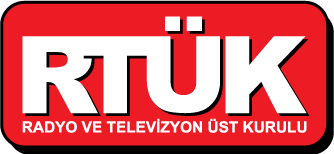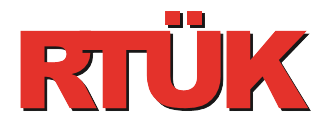Ethical Codes
Codes of Conduct of the Radio and Television Supreme Council (RTÜK)
Radio and Television Supreme Council
Institutional Codes of Ethics
I-INTRODUCTION
The Radio and Television Supreme Council, under the guidance of the below-stated regulations composed of:
- the Law No. 6112 on the Establishment and Broadcasting Services of the Radio and Television Enterprises (15.02.2011);
- the Law No. 5176 Related To The Establishment Council Of Ethics For Public Service And Making Modifications On Some Law (08.06.2004);
- Regulation on the Principles of Ethical Behavior of the Public Officials and Application Procedures and Essentials (13.04.2005);
- Public Officials Ethical Guide (2009);
- The Strategy for Increasing Transparency and Strengthening the Fight Against Corruption (2010-2014),
- Quality Policy of the Radio and Television Supreme Council (2008),
- Council of Europe, Codes of Conduct for Public Officials (11 May, 2000),
and
· taking the views and recommendations as well into consideration as the essentials expressed by the personnel in small groups during the negotiations which were carried out by Radio and Television Supreme Council,
as an autonomous and impartial public authority with regulatory and supervisory functions in the area of radio and television broadcasting; considering its effective position in terms of developing ethical sensitivity and rendering ethical culture dominant in its body, the broadcasting sector and the society in general, has adopted these "Institutional Codes of Ethics/Ethical Principles".
II- OBJECTIVE
The objective of institutional Codes of Ethics of the Radio and Television Supreme Council is to determine the institutional behavior principles that its body personnel must comply with while performing their duties, to ensure them abided by all and to be informative and accountable any time for them before the public.
III-SCOPE
The institutional Codes of Ethics of the Radio and Television Supreme Council encompass all personnel at all levels and titles in the body.
IV- institutional Codes of Ethics of the Radio and Television Supreme Council
Institutional Codes of Ethics of the Radio and Television Supreme Council includes the subjects stated below:
- General Ethical Principles
- Relations with Counterparts
- Ethical Responsibilities of Managers
- Ethical Responsibilities of Employees
- GENERAL ETHICAL PRINCIPLES
- With the consciousness that it is their own responsibility to act in line with the institutional ethical principles, all of the personnel at all levels and titles employed within the body of the Radio and Television Supreme Council:
- should carry out their duties in accordance with the Constitution, laws, international obligations, instructions given properly in framework of the laws, codes of conduct determined for public officials;
- should make no discrimination in practising their duties by this or that way between their colleagues and service recipients, they should not behave in an arbitrary way by maintaining an opposite attitude to any person, group of people or institution, however, they should be respectful to all by protecting everyone’s legal rights, duties and interests and use their discretion in an unbiased way;
- should carry out their services in accordance with their determined standards and processes, provide the necessary explanatory information to those who benefit from the service unless there is a contrary provision in the legislation, care about the satisfaction of the citizens, and give confidence to the service recipients with their work and behavior;
- should act in a manner befitting the dignity of being a public official;
- should not send anonymous and unsigned letters or messages to the managers and staff of the institution, and they should not rely on such letters or messages. However, necessary actions should be taken to identify those who send them.
Each personnel at any level and under any title in the body of the Radio and Television Supreme Council:
· should be faithful to the autonomy and independence of the institution, which is a Sine Qua Non of the law No.6112, a legal institutional priority needed to be protected.
· considering that the broadcasting principles determined by the law also include moral standards and that these may change in accordance with various segments of society and over time, should benefit from the previous practices of the institution, scientific documents, court decisions and expert reports in order to reach in the correct conclusions.
- must act in accordance with the policies of the institution while performing his duties; In the area of radio and television broadcasting, studies should be carried out to raise audience awareness, respect human dignity and fundamental rights and freedoms, ensure freedom of communication and create a pluralist media.
- RELATIONS WITH COUNTERPARTS
2.1. For personnel at all levels and titles; It is essential that there is no discrimination between public institutions, citizens, broadcasting organizations and other counterparts with whom RTÜK has relations, that services are carried out fairly and impartially, that practices are carried out within the framework of equity, that all counterparts are treated equally, and that care is taken to protect vulnerable groups.
2.2. Counterparts of the Radio and Television Supreme Council:
2.2.1. should not have any expectations from the managers and employees of the institution that are contrary to the legislation and ethical principles, and they should act in a way that supports ethical principles;
2.2.2. must be clear and transparent in their transactions and cooperate closely within the framework of laws and ethical principles;
2.2.3. Instead of looking for solutions to their problems after they come to the premise of the institution, should complete their preparations in advance for all information, documents and transactions stipulated by the legislation; They should know that acting in this way will speed up transactions and prevent unethical behavior.
· ETHICAL RESPONSIBILITIES OF MANAGERS
3.1. Each Manager at any level:
3.1.1. should be an example to other personnel by attaching importance to compliance with ethical principles along with his/her successful working skills and behaviors as an efficient and productive personnel in carrying out his/her work.
3.1.2. should take precautions in his/her unit that integrity, impartiality and transparency is ensured in all processes and procedures, that a consciousness about serving the public is developed, that service is given in a timely manner, that trust in declarations is maintained, that respect of service recipients is gained, that the productivity, predictability and accountability is increased, that the level of service quality is heightened and that the people’s satisfaction is obtained.
3.1.3. should identify and debug the deficiencies of the personnel regarding their ethical principles and ensure that lessons on the Codes of Conduct are included in On the Job/In-service Training Courses given to the personnel of the institution. They should also take the personnel’s compliance with the ethical principles into account when performance measurements and success evaluations of the personnel are made and should never remain indifferent to the behaviors violating the Codes of Conduct.
3.1.4. should inform the personnel about the main objectives and values of the institution, and attaching importance to healthy communication and coordination with the personnel, they should hold regular meetings with them to share information.
3.1.5. should be respectful to the hierarchical structure of the institution. He/she should get in contact with the personnel for a duty to be fulfilled not under his/her governance through giving a prior information about the subject to that personnel’s relevant unit manager.
3.1.6. must take the necessary precautions to protect public resources and prevent them from being wasted, and such precautions must be effective, efficient and frugal when using workforce and facilities of the institution.
3.1.7. must take necessary precautions regarding the confidentiality and security of the institutional information and documents.
3.1.8. should give the list of the gifts both given and received as a result of the institution’s international relations such courtesy visits and protocol ceremonies to the Ethics Commission to be forwarded from there to the Prime Ministry Public Servants Ethics Committee by the end of January every year before any warning is issued on the matter.
3.1.9. should be held responsible for ensuring the climate of ethical principles prevail in the body of Radio and Television Supreme Council through the volunteered participation of the employees, and also for ensuring the sustainability and formulation of ethical principles.
3.2. should be held essentially accountable on their responsibilities for and liabilities from the fulfilment of their services and be should always kept ready and open wide to public supervision and evaluation. Therefore, managers should take the measures in a timely manner necessitated by their duties and powers in order to prevent the transactions and acts which are not appropriate in terms of the objectives and policies of the institution.
· ETHICAL RESPONSIBILITIES OF THE EMPLOYEES
The employees of the Radio and Television Supreme Council;
4.1. should be open wide to self-development, constantly improve and renew themselves in their area of expertise, perform their duties by increasing their qualifications in the search of providing more effective and efficient service, and frequently review themselves and the works they do,
4.2. should make it a habit to always monitor their work and behaviour for ensuring compliance with laws and ethical principles,
4.3. must demonstrate all their knowledge and skills while doing their job, fulfil their duties properly, and share information with their colleagues.
4.4. should act in accordance with the requirements of the responsibility he holds in collective work, represent his institution in the best way possible in the meetings he attends, and not cast a shadow over the reputation of the institution,
4.5. should not avoid from any responsibility or remain indifferent to problems; Instead of covering up the problem, they should resolve it in accordance with the law,
4.6. should use time effectively and efficiently, comply with the overtime rules, not request privileges regarding the overtime hours and carry out their personal things outside working hours,
4.7. should act honestly towards their superiors. An employee should not tend to behave contrary to ethical principles due to personal expectations, but should contact the superior who is hierarchically closest to him/her to solve his/her problems at work,
4.8. should review their own behaviour before criticizing the behaviour of others, and while demanding that others act to be in accordance with ethical principles, an employee should make sure that he/she also acts himself/herself in accordance with ethical principles,
4.9. should report to the relevant authorities if they are happened to be asked to act contrary to the laws and ethical principles.
4.10. must avoid situations that may conflict with their personal or public interests and prevent them from performing their duties impartially. Personal interests include any benefits provided to the person himself, his family, close relatives, friends, or persons or organizations with which he has business or political relations. In addition, it includes all kinds of liabilities, financial or otherwise, related to them.
4.11. should not make personal requests from broadcasting organizations using their positions in the institute.
4.12. should not use official or confidential information and documents that they obtained due to their duties to gain direct or indirect economic, political or social benefits for themselves, their relatives or third parties, and they should not disclose them to any institution, organization or person other than the competent authorities while they are on duty or after leaving office.
4.13. should not share any information about the institution's personnel with other persons and organizations since such information is accessible only to those with legal authority and responsibility.


